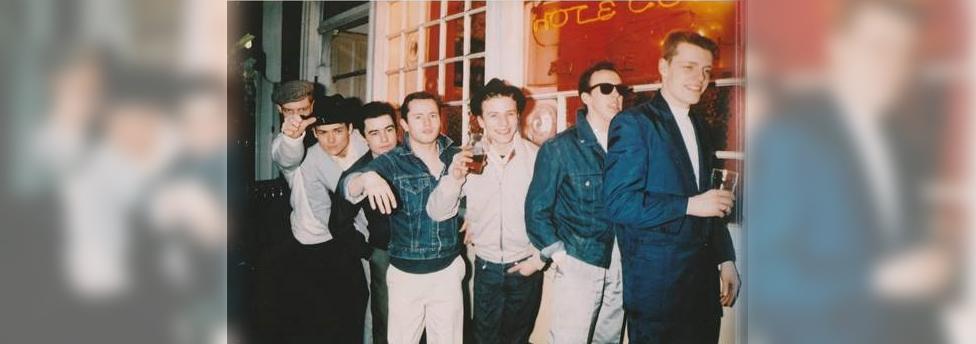Madness honour legendary Camden venue The Dublin Castle
- Published
Madness: 'We need to protect music venues'
Pop band Madness have unveiled a heritage plaque at Camden's Dublin Castle, where they made their name in the 1970s.
The Music Heritage Award is given to venues that played a crucial role in helping to create music history.
The Dublin Castle, external gave Madness a weekly residency in 1979, kick-starting their career.
"It meant everything to us," Suggs told the BBC. "We could barely play our instruments when we first arrived."
"But we started to notice that more people were coming week after week.
"Then, people started to dress a bit like us.
"Then, suddenly, there was a queue round the block - and that's when record companies started to notice.
"It was the most important thing that happened in those early days."
Tickets to those formative gigs cost just 75p (£3.48 in today's money).
"One night, we made £100 profit. What about that?" said songwriter and keyboard player Mike Barson.
"You could buy a house or two now for that amount."

Madness outside the Dublin Castle, during their residency in 1979
Madness approached PRS for Music, which administers the Music Heritage Award, to ask if the pub could be honoured with a black plaque.
"I can't think of a venue in London that's had more bands go through it," said Suggs.
"And without these venues, it would be the end of pop and rock."
With trademark good humour, the band asked guitarist Chris Foreman's father, John, to draw back a curtain to unveil the plaque - which he did, holding a pint of Guinness in his other hand.
Apart from the Nutty Boys, the Dublin Castle has played host to gigs by The Killers, Blur and The Libertines.
Amy Winehouse was known to pull pints behind the bar; while BBC Radio 6 Music's Steve Lamacq once said: "If I was an MP, the Dublin Castle would be registered as my second home."
The venue opened in 1856, and was designed to serve workmen who were building the nearby railway.
At that point, Camden had separate pubs for English, Scottish, Welsh and Irish workers, in an attempt to avoid sectarian violence.
"It meant less arguments, less fights and therefore more men showing up for work in the morning," current owner Henry Conlon told Time Out, external.
Mr Conlon's father, Alo, was the landlord who first booked Madness in 1979.
"Seven young men came in and said they were a jazz band and could they get a gig?" Henry recalled.
"Dad thought, 'Oh, jazz, that's nice and respectable.'
"He was not a little surprised the following Friday when a bunch of skinheads showed up.
"He thought, 'What am I doing?'
"But the band were Madness, and the crowd were great."
They were quickly offered a residency - and later filmed the video for My Girl, external at the pub.
Alo Conlon can be seen at the start of the video, referring to himself as "the governor".
The Dublin Castle is the 17th venue to be honoured with a Music Heritage Award.
Others include, external Imperial College London, where Queen played their first gig, and The Leadmill in Sheffield, which hosted Pulp's debut.
Madness unveiled the latest plaque as part of Independent Venue Week, which celebrates the contribution of grassroots venues to British music.
According to a recent study, 5.6 million people watched a band in a venue with a capacity of less than 1,500 customers last year.
Such venues have been struggling in recent years - with the likes of London's Astoria, The Boardwalk in Sheffield, The Arches in Glasgow and The Cockpit in Leeds all closing.
However, a report from the mayor of London released earlier this week showed the number of grassroots music venues in the capital had remained stable for the first year since 2007.

Follow us on Facebook, external, on Twitter @BBCNewsEnts, external, or on Instagram at bbcnewsents, external. If you have a story suggestion email entertainment.news@bbc.co.uk, external.
